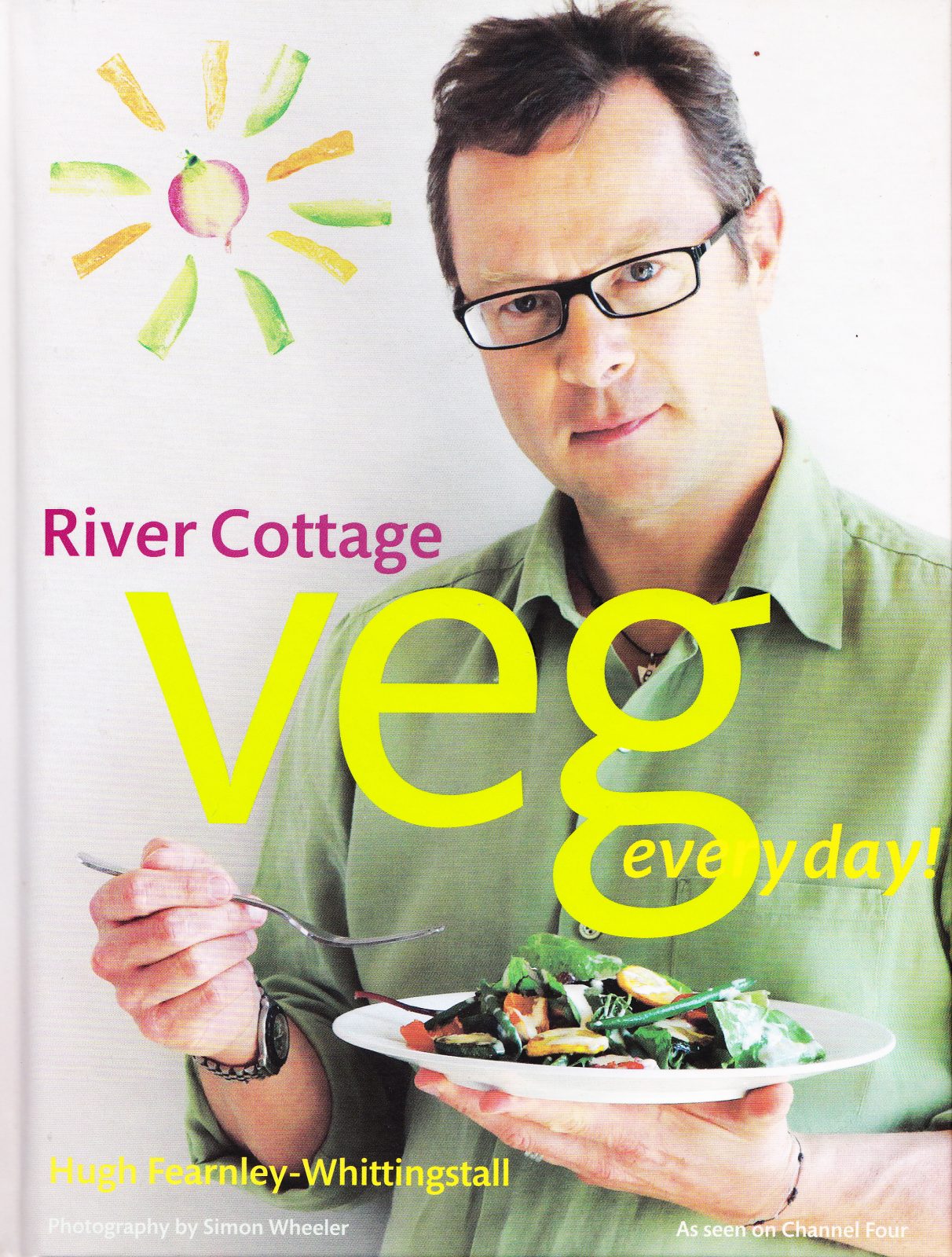
With a selection of roots in our boxes this week – and with the weather getting colder – it seems a good idea to try this ‘comfort food’ recipe from Hugh Fearnley-Whittingstall’s River Cottage Veg Every Day. He says that while it’s not exactly ‘light’, it’s certainly less rich than a creamy dauphinoise-style gratin.
You could also substitute other seasonal roots such as Jerusalem artichokes, carrots or swede which would all work well. Good served with some big flat field mushrooms simply baked with some butter, garlic and cheese, and some good bread.
Serves 4
Preparation: 20 minutes
Cooking: about an hour
Ingredients
30g butter
2 onions, halved and sliced
2 garlic cloves, sliced
1 small celeriac
2 large potatoes
3 large parsnips
a couple of sprigs of thyme, leaves only, chopped
3 sage leaves, finely chopped
about 1.2 litres vegetable stock
sea salt and freshly ground black pepper
Method
Preheat the oven the 180C/gas 4. Melt the butter in a heavy-bottomed frying pan and use some of it to grease a large gratin dish. Add the onions to the pan and sauté over a medium heat for about 10 minutes, until soft, then add the garlic and cook gently for a further minute or two.
Meanwhile, peel the celeriac, potatoes and parsnips and cut into slices the thickness of a 10p piece, slicing the parsnips lengthways. Spread out the celeriac in the gratin dish, season generously with salt and pepper, then sprinkle with half the onions and half the herbs. Layer the parsnips on top, then scatter the remaining onions and herbs on top and finish with a layer of potatoes.
Bring the stock to a simmer and add some salt and pepper, then pour over the vegetables to barely cover them (you may not need all of it). Cover the dish with foil and bake for 30 minutes, then uncover and continue to bake for another 30 minutes or so until the vegetables are cooked.
At this point, if there is still liquid covering the potatoes, spoon off a little and return the dish to the oven for 15 minutes or so, to brown the potatoes on the top. Serve piping hot.
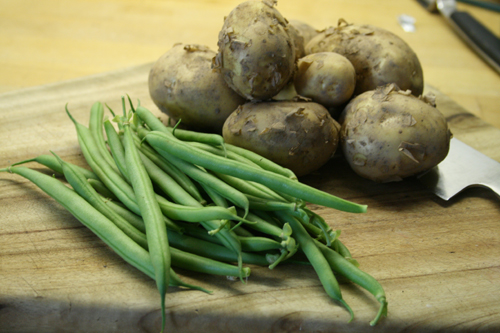
As we get our first taste of French beans from Camel CSA’s own polytunnel in this week’s veg boxes, this recipe from Sarah Raven’s Garden Cookbook seems ideal. “The squeaky texture of fresh French beans combines beautifully with the softness of potatoes,” she says, “and there are many ways of using these two in a salad.”
You can toss them both in a little truffle oil and add a few rocket leaves, or serve them like this with nut oil, toasted almonds and lots of dill.’ Parsley or chives could be substituted for the dill.
Serves 6
Preparation and cooking: 25 minutes
Ingredients
450g new potatoes
450g French beans
1 tbs walnut or hazelnut oil
4 tbsp chopped dill (or parsley, or chives)
1 garlic clove, finely chopped
230ml sour cream
1 tsp caster sugar
salt and black pepper
2 tbsp flaked or halved almonds, toasted
Method
Cook the new potatoes in boiling salted water, then cut them in half and peel if you want to. Next, cook the beans for 4 minutes (they must be crisp).
Drain the beans and potatoes, plunge the beans into cold water and drain again. Pour the oil over both while they are still warm. Toss to coat.
Combine the chopped dill and garlic with the sour cream, sugar and seasoning, and carefully fold into the potatoes and beans. Scatter over the almonds.
Also try Sarah Raven’s Spaghetti with beans and tomatoes
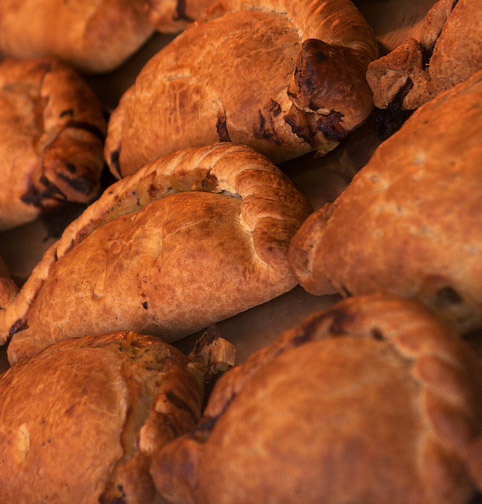
To celebrate the fact that the Cornish Pasty Association (CPA) has received Protected Geographical Indication (PGI) status for its world famous pasty, we thought you might like a traditional Cornish pasty recipe. The difficulty is finding the decisive recipe – there are as many variants as there are pebbles on the beach – but most people agree on the following:
- use a good cut of beef – skirt is the best, chuck is an alternative
- include swede (known as turnip in Cornwall), onion and potato but never carrot
- whether the ingredients are diced or sliced is debatable, but they must go in raw
- seasoning is restricted to salt and plenty of pepper
- the pastry is traditionally shortcrust, made with lard (though a Cornish friend always makes rough puff pastry for hers)
- add a knob of butter or a spoonful of cream for extra richness
The recipe that follows uses grated frozen lard – which adds to the preparation time. Use your normal shortcrust pastry if you prefer.
Serves 4
Preparation: 1 hour +
Cooking: 45-50 minutes
Ingredients
for the pastry:
350g block of lard
450g strong plain flour
pinch of salt
ice cold water to mix
for the filling:
400g beef (skirt or chuck), trimmed and diced
200g onion
200g swede
600g potatoes
salt and pepper
butter/cream
egg wash
Method
Put the lard in its wrapper in the freezer and leave for about an hour until hard. Sift flour and salt into a mixing bowl. Remove the lard from the freezer, peel back the paper, dip into the flour and grate it into the bowl, dipping back into the flour every now and again to make the grating easier. Mix the grated lard evenly into the flour by making sweeping scoops with a palette knife until it resembles heavy breadcrumbs. Stir in 1 tbsp of water at a time until the dough clings together, then form it into a ball. Place the dough in a plastic bag and chill in the fridge for 30 minutes.
Preheat the oven to 200C/gas 6. Keeping separate piles, peel and coarsely chop the onion and peel and dice the swede and potatoes. Roll out the pastry and cut out four circles about the size of a small dinner plate. Sprinkle onion and swede across the centre of the pasty in an oval shape, leaving a 2cm border. Season with salt and pepper. Cover with the meat and then half the potato. Season again and then add the remainder of the potato.
Moisen half the pastry border with a little water, bring up each side of the circle of pastry to enclose the filling, and press together to form a ridge. Crimp with your fingers (see note below).
Grease a flat baking sheet and sprinkle with water. Transfer the pasties to the sheet, prick them in a few places on either side of the seam with a fork and paint all over with egg wash. Bake for 15 minutes, then lower the temperature to 150C/gas 2 and cook for a further 30-40 minutes.
NOTE: How and where to crimp is another question. Some say the crimp should be on top, some on the side. My Cornish friend says she does the crimping on the side then turns the pasty over as she puts it on the baking sheet so that the crimp ends up on top. The CPA’s own recipe shows the crimp on the side.
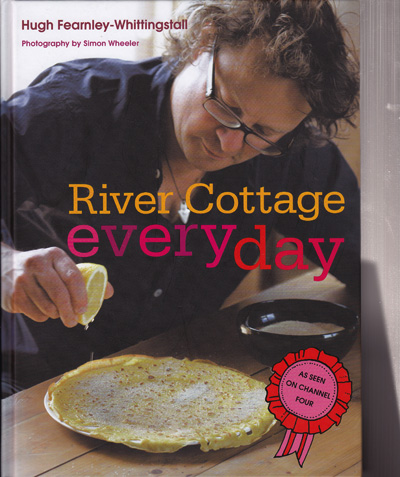
From Hugh Fearnley-Whittingstall who says: “Of course, you don’t have to stick to three roots: you could use two, four or as many as suits you. Do always include potatoes, however, to give the mash body and to stop it getting too sweet.”
Swede or celeriac could also be used as a mash with potatoes.
Serves 6
Preparation and cooking: 30 minutes
Ingredients
500g carrots, peeled and cut into chunks
500g parsnips, peeled and cut into chunks
500g floury potatoes, peeled and cut into chunks
50g unsalted butter or 50ml rapeseed oil
100ml milk (or half milk and half double cream)
freshly grated nutmeg (optional)
sea salt and freshly ground black pepper
Method
Cook the carrots and parsnips in a pan of boiling salted water until tender. Cook the potatoes in a separate pan. Drain the vegetables and let them steam dry for a minute or two.
Put the carrots and pasnips in a food processor (or mash with a potato masher), with half the butter or oil, and blend to a creamy puree. Heat the milk and the remaining butter or oil in the pan in which the potatoes were cooked, then add the potatoes and mash until smooth.
Combine the mashed vegetables, adding plenty of seasoning, including nutmeg if you like, to make a creamy, golden mash. Serve steaming hot, with sausages or roast lamb or venison.

Jamie Oliver suggests this as a luxurious alternative to Christmas roast potatoes. Of course, if you’re catering for lots of people, you could always have the gratin as well as the roasties.
Serves 8-10
Preparation: 15 minutes
Cooking: about an hour
Ingredients
a large knob of butter
200ml semi-skimmed milk
300ml double cream
2 bay leaves
2 cloves of garlic, peeled and finely sliced
sea salt and freshly ground black pepper
2.5kg potatoes, peeled and thinly sliced
a handful of fresh thyme
a handful of freshly grated parmesan cheese
olive oil
6 rashers of streaky bacon, chopped
a handful of vac-packed chestnuts, peeled and crumbled
Method
Preheat the oven to 200C/gas 6. Butter the inside of an ovenproof dish, around 30cm x 30cm, and at least 6cm deep.
Pour the milk and cream into a wide pan with the bay leaves and garlic. Bring to the boil, then simmer gently for a minute or two. Remove from the heat and season with salt and pepper.
Add the potatoes and most of the thyme leaves and stir well. Spoon into the gratin dish and shake to even everything out. Sprinkle with the parmesan then cover with an oiled piece of foil. Bake for 45 to 50 minutes.
Meanwhile, fry the bacon in a little olive oil until crispy and golden. Add the remaining thyme and stir in the chestnuts. When your gratin is ready, remove the foil and spoon the bacon and chestnut mixture over the top. Pop it back in the oven for another 10 minutes until gorgeous and crispy on top.
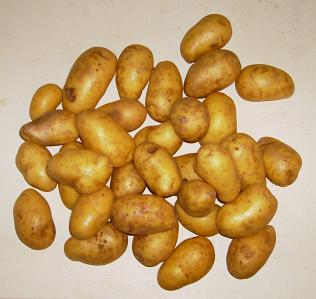
This is a simple way of cooking new potatoes that’s very different from the usual buttered, boiled or steamed. It comes from Henrietta Danvers, who’s one of Camel CSA’s volunteer picking and packing team members.
Serves 6
Preparation: 10 minutes
Cooking: 45 minutes
Ingredients
750g baby new potatoes, skin on
4 tbsp olive oil
salt and freshly ground black pepper
2 garlic cloves, crushed
1 lemon, zest and juice
Method
Preheat the oven to 220C (200C fan) or gas mark 7. Wash the potatoes, keeping the skin on. Put them in a roasting pan. Drizzle half the oil over the potatoes and season. Roast for 45 minutes and remove when soft. Mix the garlic, remaining oil and lemon zest and juice. Spoon through the hot potatoes and serve.
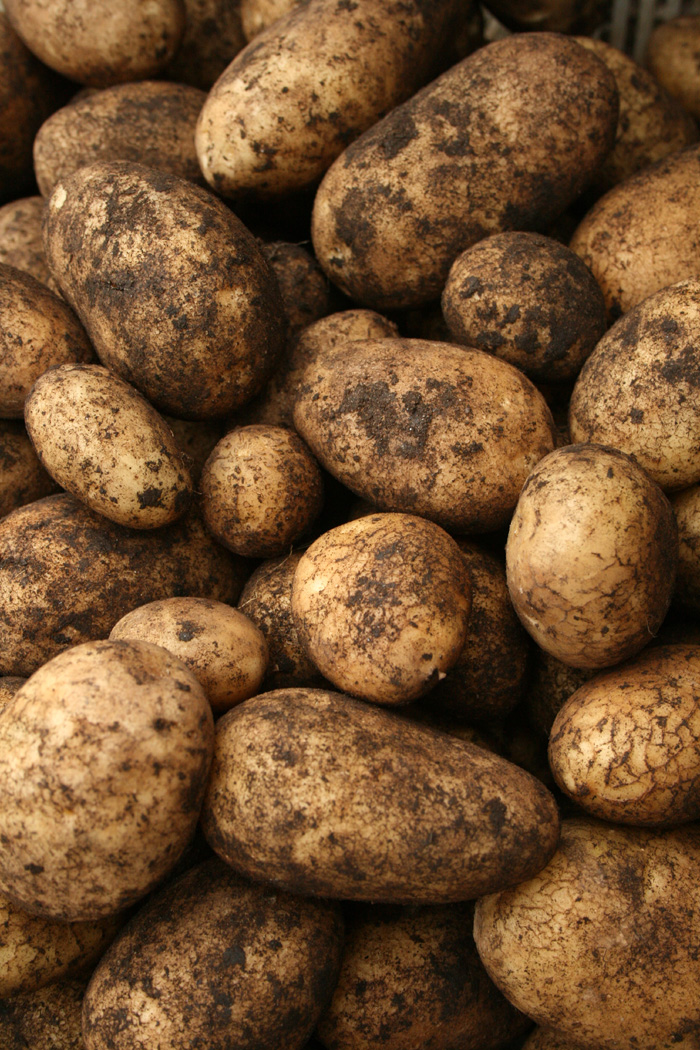
From Nigel Slater’s Tender cookbook. “Good with lamb,” he says.
Enough for 6
Preparation: 15 minutes
Cooking: 50 minutes
Ingredients
5 medium potatoes (floury are best)
90g butter
leaves from 4 sprigs of thyme
Method
Set the oven to 200C/Gas 6. Peel the potatoes and slice them thinly. They should be so thin that you are almost able to see through them. If you tend to work slowly, put the sliced potatoes into a bowl of cold water to prevent them browning.
Melt the butter, then brush some of it on to the bottom and sides of a loaf tin (or use a round, solid-based tin). Cover with a piece of greaseproof paper, leaving a little extra overlapping the sides to get hold of when you come to turn out the cake. Cover the bottom of the tin with slices of potato, brush with more butter and season with salt, pepper, and a light sprinkling of thyme leaves. Continue layering the potatoes, adding the butter and seasonings every two or three layers, until you have used them all up. Pour any remaining butter over the top. Bake for 40-50 minutes, till the top is golden and a skewer can be inserted effortlessly into the layers of tender potato.
To serve, lift the potato cake out by holding both long sides of the greaseproof paper and pulling upwards. Cut into six pieces. If it falls apart, and well it might, just push the slices back together.
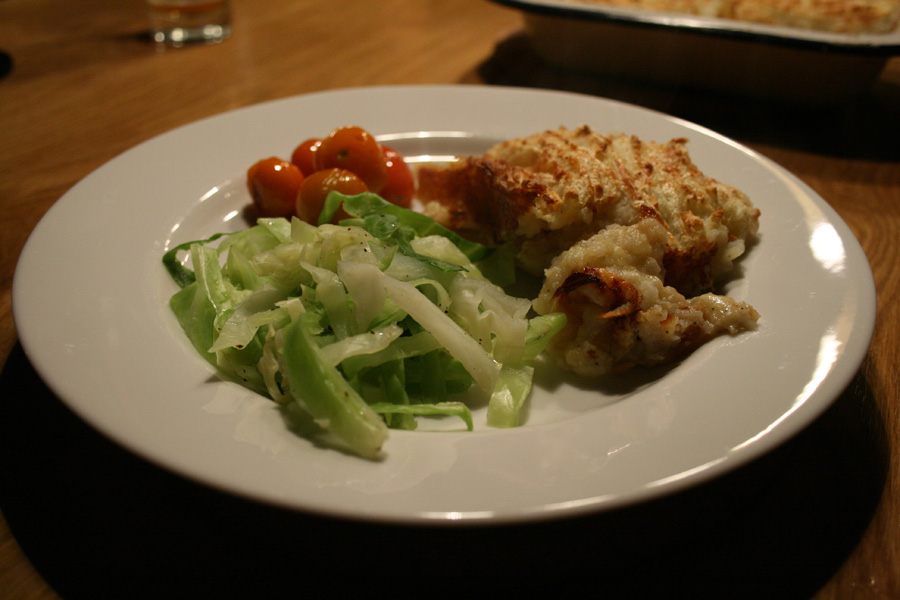
Nigel Slater calls it ‘a cheesy pie to warm the soul’. It’s from his Kitchen Diaries book. And it doesn’t have to be Stilton – Cornish blue, Sue’s Trelawney – any fairly strong cheese will work just as well.
Serves: 6
Preparation time: 30 minutes
Cooking time: 25-30 minutes
Ingredients
1.5kg floury potatoes
4 medium onions
80g butter
150ml milk
225g Stilton or other cheese
25g grated Parmesan
Method
Peel the potatoes, cut into halves or quarters and cook in boiling salted water until tender – about 15 minutes.
While the potatoes cook, peel the onions and cut them in half, then cut each into five or six segments. Put them in a heavy-based frying pan with 40g of the butter and let them cook over a moderate to low heat, stirring from time to time. They will need 20-25 minutes to become thoroughly soft and sticky.
Bring the milk to the boil and turn off the heat. Drain the potatoes, then tip them into the bowl of a food mixer, or mash them in the pan with a hand-held beater. Slowly add the milk and the remaining butter. Beat to a smooth mash.
Set the oven to 200C/Gas 6. Butter the base and sides of a 28cm baking dish. Spoon in half the potato, smooth it a little, then add the onions and a grinding of black pepper. Crumble the cheese over the onions. Pile the rest of the mash over the top and smooth lightly with the back of a spoon.
Dust over the grated Parmesan, then bake for 25-30 minutes, by which time the top will be pale gold and the filling will be bubbling up around the edges.
Enough for 6 as a main dish with greens or a salad.
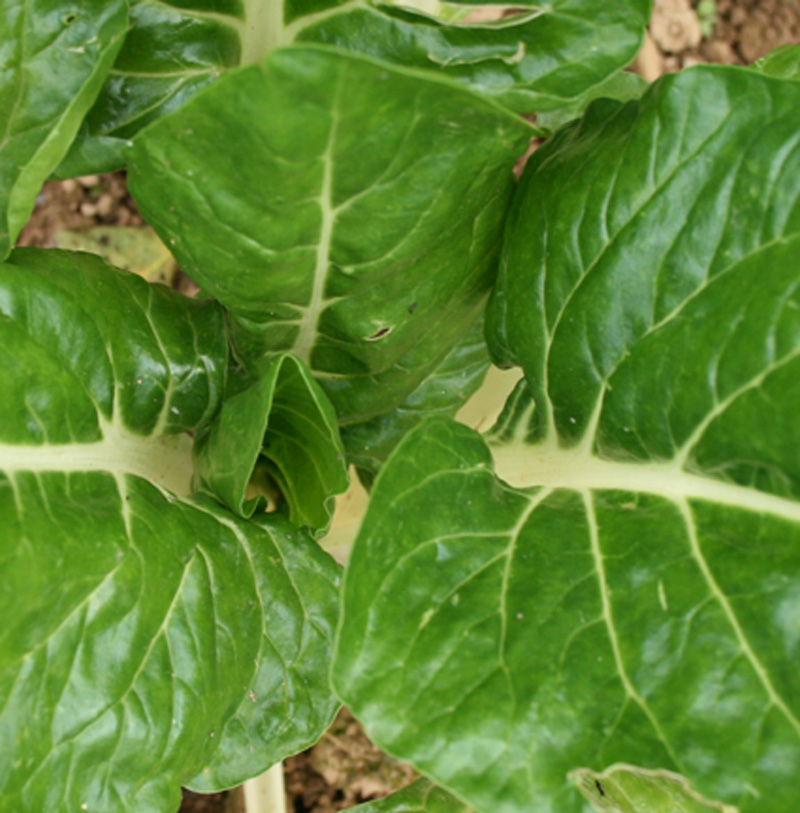
Another excellent recipe from the Riverford Organic Vegetables website.
Preparation time: 25 minutes
Cooking time: 55 minutes
Serves: 4
Ingredients
500g Swiss chard
75g butter
2tbsp plain flour
100g cheddar cheese
750g potatoes
4 garlic cloves
600ml (1 pint) milk
salt and pepper
Method
1. Remove and roughly chop the green part of the chard leaves. Cut the stalks into 2cm lengths and steam for 10 mins. Stir in the green leaves and continue to cook for a few minutes.
2. Wash the potatoes and cut into 1cm slices. Boil for 5 mins until just tender. Drain.
3. Grease a shallow baking dish and layer with half the potatoes, the chard, then the remaining potatoes.
To make the sauce:
1. Melt the butter and fry the crushed garlic for 2 mins. Stir in the flour and continue stirring for 1 min.
2. Gradually add the milk, stirring continuously until the sauce thickens.
3. Add half the grated cheese and season with salt and pepper.
4. Pour the sauce over the vegetables and top with remaining cheese. Bake at 180° Mark 4 for 35 mins.
Do you have a recipe for Swiss chard that you would like to share with the rest of us? Just click on Comments at the top of this article and let us have it!
Click here to see all the recipes that Camel CSA members have recommended so far.

This spectacular but easy dish can be found on the Riverford Organic Vegetables website
Preparation time: 5 minutes
Cooking time: 30 minutes
Serves: 4
Ingredients
Per person:
1 sheet baking parchment
5 small new potatoes
5 cloves of garlic unpeeled – wet garlic can also be used
small branch rosemary or several branches of thyme
1 tbsp virgin olive oil
salt & black pepper
Method
The idea for this came from Alice Waters at Chez Panisse.
1. If the potatoes are large – cut in half, wash, but leaves skins on. Preheat oven to 200ºC (gas mark 6).
2. Fold the baking parchment in half to make a crease; open and lay potatoes on the lower half. Tuck in garlic and herbs. Pour olive oil over spuds and season with salt and pepper. Bring the rest of the paper down and roll lightly along the edges to form a pouch (a bit like pastry). Make sure that the package is sealed.
3. Bake for 30 minutes and serve immediately. The ‘pastry’ packages will “puff up”. The packages are best opened at the table.
Notes
I first tasted this delicious method of preparing the new potatoes in our veg boxes when visiting Riverford Organic Vegetables in Devon to tour the farm and to have lunch in its Field Kitchen. The resident chef, Jane Baxter, used to work at the River Cafe in London. It shows!
If you have a way of cooking new potatoes you’d like to share, please let us have it. Click on the comments link at the top of this post and get writing…
Click here to see all the recipes that Camel CSA members have recommended so far.


